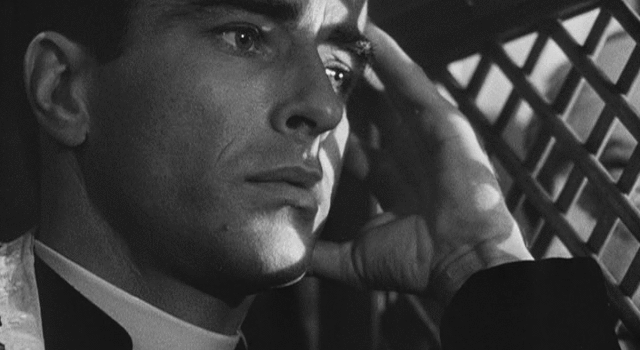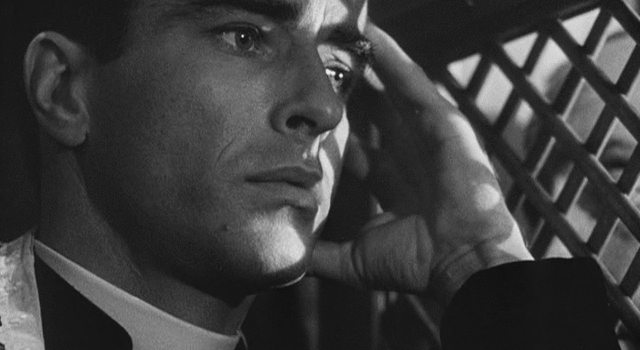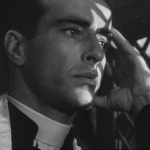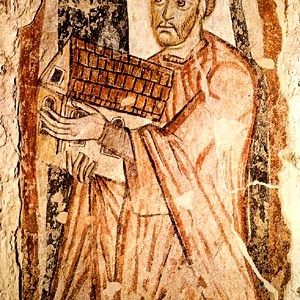It’s a dark night in Quebec. From the rectory window, Father Michael Logan notices a man in a dark coat enter the empty St. Marie Church. Puzzled, the priest investigates, grabbing a candle to move through murky shadows. As he approaches, the light reveals the haggard face of the handyman, Otto Keller.
“I want to make a confession,” Keller says.
What Father Logan hears under the seal of the confessional that night is the catalyst for the terrible series of events that make up the fictional 1953 film, I Confess.
With the coming of Halloween, followed by All Saints Day and All Souls Day, this is a perfect film to reflect on as we cooperate with God’s will to work out our salvation amidst the battle between good and evil.
This classic film is a suspenseful, moving tale immersed in the Catholic faith that director Alfred Hitchcock himself professed. And yet, it isn’t preachy in the least and appeals to Catholics and non-Catholics alike! The film accomplishes this difficult feat by using symbols that create intriguing layers, immersing the audience in the story.
One of the most powerful symbols is an absurdly small detail that can be easily overlooked: the first name of Otto Keller’s wife, which is Alma – or “soul.”
Keller confesses to murder
What began as an attempt to steal $2,000 ended with murder, Keller confesses.
Father Logan generously secured jobs at the rectory six months earlier for German immigrants Keller and Alma. Keller believes Father Logan gave them the jobs because “You saw that my wife and I were not common servants.” Keller’s arrogant superiority eventually leads to discontent.
Keller finally decides to steal $2,000 dollars from the mysterious lawyer, Mr. Villet, who had hired him as a gardener. Keller disguises himself in a priest’s cassock and sets off towards Villet’s house to steal the money, killing the lawyer when caught thieving.
Keller claims he came up with the idea to steal because “my wife work[s] so hard. It breaks my heart.”
When Keller arrives home after the murder, he tells Alma what he has done. Keller is terrified to obey Father Logan’s command to return the stolen money. Keller revolts against the idea – he will be executed!
Alma panics, worrying that Father Logan will inform on Keller. Keller’s face hardens as he reminds her that the seal of the confessional will force Father Logan’s silence, since he can’t divulge what he heard in confession.
Alma’s fear goads Keller further into desperation, and he decides to hide his crimes pretending to “discover” the body the next morning.
Father Logan Framed
On the morning after the murder, an anxious Father Logan meets Madame Ruth Grandfort outside the scene of the crime. Father Logan and Ruth had scheduled an appointment with Villet, who is blackmailing her.
Before Michael Logan became a priest, he and Ruth were going to be married. When war struck, Logan joined the army. He gave Ruth permission to marry elsewhere if she chose. As time dragged by in misery, Ruth met young lawyer Pierre Grandfort and married him. The day Logan returned, Ruth didn’t tell Logan she was married.
They spent the day of his return in the countryside, when a rainstorm forced them to seek shelter in an empty gazebo, missing the ferry back to the mainland. Still unaware Ruth was married, Logan did not do anything inappropriate that night. However, the next morning, Villet found them in the gazebo on his property. He called Ruth out as “Madame Grandfort,” to Logan’s shock.
After that, Ruth and Logan had little to no contact. Logan soon discovered his vocation to the priesthood. Soon after encountering Villet at Logan’s ordination, Ruth began being blackmailed by the shady lawyer. Ruth finally turned to Father Logan for help. Coincidentally, they met to discuss a plan of action right before the time of Villet’s murder. After the meeting, when Father Logan walked back to the rectory, he had a window of opportunity to have committed the murder.
It doesn’t help that Keller, who sliding down a steep moral descent, decides to plant the bloody cassock in Father Logan’s belongings.
As the story unfolds, police detective Inspector Larreau follows the misleading “evidence” to none other than the blameless Father Logan.
The Court Case
The court case is where Keller demonstrates the increasing lengths he is willing to go to hide his crimes – and the horrifying consequences of his determination to frame Father Logan. Keller perjures himself, fabricating a story about encountering a tormented Father Logan in St. Marie’s church after the murder. The crown prosecutor also makes implications that Father Logan and Ruth have been having an affair, and everyone – including the jury – believes this lie.
Although the jury’s verdict of “not guilty” declares that the evidence is inconclusive, Father Logan’s reputation is tarnished as he exits the courtroom. Alma’s eyes have been filled with guilt throughout the whole proceeding, and Keller has even had to restrain her from speaking up. At the verdict of “not guilty,” Alma looks relieved, but as a violent mob seethes toward Father Logan outside the courtroom, Alma can’t remain silent any longer. Before Keller can stop her, she runs forward, declaring Father Logan’s innocence. She’s about to point to Keller as the murderer when the unthinkable happens: gunshots ring out.
Keller has shot his beloved Alma.
As Alma lays dying, one of Father Logan’s fellow priests absolves her. Inspector Larreau desperately asks her to explain. With her dying breath, Alma turns to Father Logan and says, “Forgive me.”
The Last Confession
Inspector Larreau chases Keller in a mad pursuit through the Chateau Frontenac hotel. Utterly without restraint, Keller unleashes violence upon anyone standing in his way, shooting an innocent bystander. Although a frustrated Larreau repeatedly asks Father Logan to explain Keller’s behavior, Father Logan is silent, to Larreau’s bewilderment.
Finally, the police and Keller reach a standoff when Keller takes shelter in a ballroom.
Larreau confronts Keller, accusing him of killing Villet. Keller believes Father Logan spilled the beans to Larreau and starts berating the priest, ranting about his confession – which finally explains Father Logan’s silence to the police.
The police shoot Keller in the shoulder. Risking his life, Father Logan enters the room, trying to convince Keller to surrender.
“Where is my Alma?” Keller moans, unaware that his wife is dead.
“She’s dead,” Father Logan says. “You killed her.”
Keller has killed Alma – he has killed his soul. That’s the heart of the whole story. Catholic horror writer Flannery O’Connor once said regarding novels, “…the greatest dramas naturally involve the salvation or loss of the soul. Where there is no belief in the soul, there is very little drama.”
The battle inside the soul is the crux of I Confess, and culminates in a dramatic ending. In despair, Keller is about to kill Father Logan, when the police opens fire on Keller.
In his dying moments, Keller groans, “Oh Father, help me…. Forgive me.”
As the curtain falls, Father Logan absolves his tormentor.












